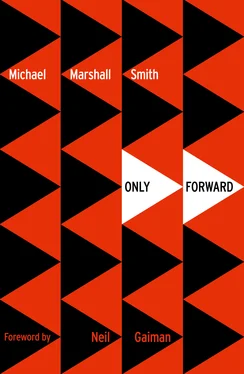There was no point going back into Red to talk to him now: after eight years, many of them spent out of his head, there was little chance he was going to remember anything new. All I could do was memorise what I had, and try to replicate his entry.
I remembered him being very insistent on one thing: if you’re going to try to break in, do it during the day. Most of the Neighbourhoods are geared for twenty-four-hour living, though activity does thin out a lot at night. It’s only places like Red that go full on all the time. But Stable, Snedd had said, shuts tight at 11.00 p.m. That had been his mistake. He’d broken in at night, because that’s what you generally do, to find himself the only moving person.
Apart from the Stable police, that is. That’s why he’d been caught, and that’s why he was a living time-bomb. He’d been lucky, too. By chance he’d been caught in a built-up area: had it been possible, the police would simply have shot him on sight.
By the time I was near my mono stop the walls of the carriage looked like an explosion in a paint factory as they strove to meet the challenge of evoking my mood. In most Neighbourhoods I have a contact, I have an angle, I have some way of protecting myself, of keeping this just a dangerous game. In the Centre I have Zenda. In Red I have Ji. In Natsci I have a guy called Brian Diode IV, who can break the security code of just about any computer in The City, given the time and enough pizza. In Brandfield I know a girl called Shelby who has a two-person heliporter, which has saved my life more than once.
And so on, and so on. In Stable I had nothing. Blending in was not going to be easy, always assuming I could gain entry in the first place, and if I didn’t, I was going to die.
Also, what the hell was going on in the Centre? I’ve known Zenda a long time, and I’d never seen her looking the way she had tonight. A little paranoia was natural in a Neighbourhood where absolutely everybody was trying to clamber over the top of everybody else, but she hadn’t been looking paranoid. She’d looked like something was worrying her, but she wasn’t sure what it was. I found that very worrying.
Also, who the hell were we dealing with? Any gang who could not only steal an important Actioneer but then sneak him into a forbidden Neighbourhood and keep him there undetected was a group of serious over-achievers. If they found out I was looking for them then the Stable police were going to be the least of my problems, and I wouldn’t have Ji or even Snedd around to help.
How do I get myself into these positions? Why do I do this job? Why do I still need this safety net, this thing to be? Isn’t it time to say goodbye now?
There was a quiet pinging sound, and I looked up to see that the walls were fading to a uniform black. I’d broken the carriage’s mood detector.
Bugger this, I thought. I had to wait till tomorrow anyway. I was going to take a break. I was going to find my cat.
I stayed on the mono to the far side of Colour, and then got off at the transfer portal. I had to go through another Neighbourhood to get where I was going, which meant buying another ticket. An attendant inspected me at the gate, checked that I was wearing quiet shoes, and nodded. I went over to the ticket office and pointed on the map at where I wanted to go. The man behind the counter nodded, and held up three fingers. I handed him three credits as quietly as I could, and he passed me a ticket. Then I tiptoed over to the platform and waited.
The next Neighbourhood along from Colour is Sound, so named because they don’t allow any. When the mono arrived it pulled up with barely a whisper, and the doors opened silently. I stepped into the carriage and sat carefully down on the padded seat. My journey wasn’t going to take that long: Sound isn’t very big, thank Christ. It gives me the creeps.
The carriage was empty. The Sounders have one hour every evening where they’re allowed to go into a small room and shout their heads off, and I was bang in the middle of that hour. I still couldn’t make any noise though, as the carriages have microphones all over the place. If you make any noise a silent alarm goes off somewhere and they come and throw you silently off the mono, and you have to walk silently down the silent streets instead, which is even worse.
So I sat and thought, trying to calm my mood and also to remember as much as possible of what Snedd had told me about Stable.
There wasn’t much. The Neighbourhood had been forbidden right from the start. When The City reorganisation had started to take place, Stable had simply built a wall all around itself, shut out the sky, severed all connections with the outside world and pretended it didn’t exist. The first generation knew it did, of course, but they were forbidden to tell their children. They were happy not to: the first generation stayed in Stable because they liked it that way.
They were all long dead now, and the sixth and seventh generations had no idea the outside world existed. As far as they knew, the whole planet apart from the area they lived in had been destroyed in a nuclear war. They could walk up to the walls and see through windows and sure enough, outside was just a barren red plain blown with radioactive sand. The windows were in fact vidiscreens maintained by the authorities whose job it was to keep things going on the way they were.
The very last thing those authorities want is for anyone to make it in from the outside: it would blow the whole thing and trash hundreds of years of desired deception. Desired, because I’m not talking about repression here. The Stablents aren’t kept in ignorance against their will. It’s all they know, and it’s all they want to know.
A couple got on the mono and tried to engage me in conversation, but as my signing isn’t too hot it was a rather stilted dose of social interaction. They’d clearly been shouting, and looked flushed and excited, obviously keen to get home and make mad, passionate, silent love. After a while they left me to my own silent devices, though they did both keep pointing at my shirt, giving me the thumbs up and smiling broadly. I couldn’t work out what they meant.
At the portal exit I stood still for a moment, gearing myself up, flexing my weirdness-resilience muscles. Sound is a weird Neighbourhood, but where I was going now was far weirder. I was going into the Cat Neighbourhood.
A long time ago, some eccentric who’d gained control of a largely disused Neighbourhood decided to leave it to the cats. The place was a complete mess, falling down and strewn with rubbish and debris. He forced the few remaining people out, built a wall round it and then died, making it irrevocably clear in his will that no one was to live there henceforth except cats.
Ho ho, thought everyone, what a nut. We’ll leave it a couple of years, and then move in. A cat Neighbourhood, ha ha.
And then the cats started to arrive. From all over The City, one by one at first, and then in their droves, the cats appeared. Cats who didn’t have owners, or had cruel ones, cats who weren’t properly looked after, or just wanted a change, cats in their hundreds, and then thousands and then hundreds of thousands, moved into the Neighbourhood.
Interesting, everybody thought.
After a while a few people decided to visit the Neighbourhood, and they discovered two things. Firstly, if you don’t love cats, they won’t let you in. They simply will not let you in. Secondly, that there was something very weird going on. The rubbish and debris had disappeared. The buildings had been cleaned. The grass in the parks was cut. The whole Neighbourhood was absolutely and immaculately clean.
Interesting, everybody thought, slightly uneasily.
The lights work. The plumbing works. People who go into the Neighbourhood to visit their cats sleep in rooms that are as clean as if room service has just that minute left. Each block has a small store on one corner, and there is food in that store, and it’s always fresh. A cat sits on the counter and watches you. You go in, choose what you need, and leave.
Читать дальше











